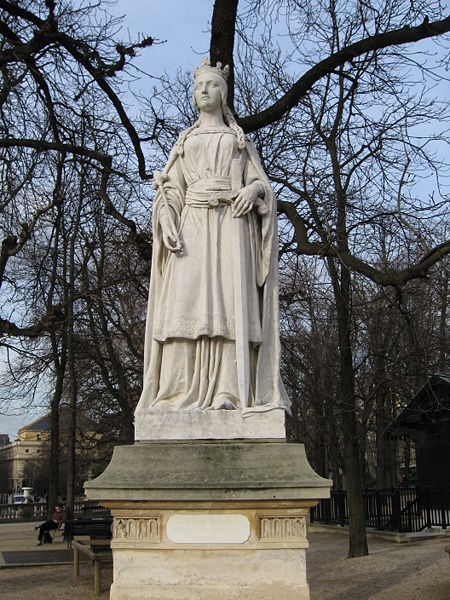[Statue of Matilda of Flanders, 1850, Carle Elshoecht, Luxembourg Gardens, Paris, source: Wikimedia Commons]
Matilda was the daughter of Baldwin V of Flanders and Adela of France. Through her father she was descended from Alfred the Great of Wessex, while through her mother she was niece and granddaughter to the French kings. She was betrothed to William of Normandy when she was 19 or thereabouts and married him a few years later, despite a papal ban on grounds of consanguinity. In 1059 the couple would found a pair of monasteries in Caen to make up for their defiance. They would go on to have at least eight, possibly nine children together, all of whom were very well educated, at Matilda’s insistence.
During the next several years Matilda would act as one of William’s most trusted advisors. When he sailed for England, he left their eldest son Robert nominally in charge but gave Matilda the real power in Normandy, making her regent. She was a shrewd ruler, and managed to bring stability to a duchy that was said to be “notoriously susceptible to anarchy.” When news of William’s victory in England arrived Matilda rejoiced, but she would not actually join him in England for another year. She was the first woman to actually be crowned Queen of England** and her coronation made clear just how much power she was to have. William, seeing how well she ruled Normandy, had declared that she could with his authority anywhere in his domains.
Over the next several years, Matilda acted both with her husband and separately from him, both in England and in Normandy, including accompanying him in the Harrying of the North. She was particularly involved not only in religious work (a traditional sphere of influence for queens), but also in the administration of justice and is known to have judged several major disputes. When their son Robert rebelled, Matilda supported him monetarily, but seems to have preferred to act as mediator between father and son. She died in 1083 with William at her side and was buried in her monastery, the Abbey of Sainte Trinité, where her daughter Cecelia was a nun.
*Also known as William the Conqueror or William the Bastard.
**Her ancestor, Judith of Flanders was both crowned and anointed 855, but as Queen of Wessex, not Queen of England, and even this was highly unusual.
Matilda of Flanders - Epistolae
Borman, Tracy. Queen of the Conqueror: the Life of Matilda, Wife of William. New York: Bantam Books, 2011.
Douglas, David C. William the Conqueror. Yale University Press, 1964, 1999.

 RSS Feed
RSS Feed
